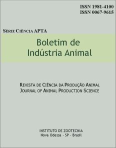Seasonal growth of the eight tropical forage legume
Abstract
The seasonal growth of eight tropical legumes, Glycirie wightii cv. comum and cianova, Centrosema pubescens, galactia striata, Macrotyloma axilíare, Calopogonium mucunoides, Teramnus uncinatus and Pueraria phaseoloides was determined during two years at the Instituto de Zootecnia, Nova Odessa, State of São Paulo, Brazil. It was a cutting trial and the results were expressed in terms: a) crops growth rate as kg of 65°C dry matter/ha/day; b) seasonal curve of growth; c) €œsummer€ and €œwinter€ dry matter production ;d) bromatological composition variation of legumes estudied. Galactia showed higher rate of growth than other legumes except in December, January and April, and gave better seasonal distribution. Perennial soybean cv. cianova, macrotyloma and cudzu tropical had a good seasonal distribution of growth. Commom perennial soybean, calopogonium and centrosema had satistactory seasona distribution, but teramnus had the poorest seasonal distribution The annual production of dry matter/ha at 65°C as €˜summer€™ and €œwinter€ distribution was respectively : galactia 5,892kg with 31 and 69%; perennial soybean cv. Cianova 5,675kg with 20 and 80%. Perennial soybean cv. common 5,260kg with 16 and 84%; cudzu-tropical 4.974kg with 15 and 85%; teramnus 3.932kg with 16 and 84%; macrotyloma 3.725 with 22 and 78%; Centrosema 2.825kg with 12 and 88% and calopogonio 2,369kg with 13 and 87%. The bromatological analysis showed the higher protein contents for centrosema. 26.1%. and the lower fiber contents for calopogonio, 28,8%.Downloads
Downloads
Published
Issue
Section
License
Os autores não serão remunerados pela publicação de trabalhos, pois devem abrir mão de seus direitos autorais em favor deste periódico. Por outro lado, os autores ficam autorizados a publicar seus artigos, simultaneamente, em repositórios da instituição de sua origem, desde que citada a fonte da publicação original seja Boletim de Indústria Animal. A revista se reserva o direito de efetuar, nos originais, alterações de ordem normativa, ortográfica e gramatical, com vistas a manter o padrão culto da língua e a credibilidade do veículo. Respeitará, no entanto, o estilo de escrever dos autores. Alterações, correções ou sugestões de ordem conceitual serão encaminhadas aos autores, quando necessário. Nesses casos, os artigos, depois de adequados, deverão ser submetidos a nova apreciação. As opiniões emitidas pelos autores dos artigos são de sua exclusiva responsabilidade. Todo o conteúdo deste periódico, exceto onde está identificado, está licenciado sob a Licença Creative Commons Attribution (CC-BY-NC). A condição BY implica que os licenciados podem copiar, distribuir, exibir e executar a obra e fazer trabalhos derivados com base em que só se dão o autor ou licenciante os créditos na forma especificada por estes. A cláusula NC significa que os licenciados podem copiar, distribuir, exibir e executar a obra e fazer trabalhos derivados com base apenas para fins não comerciais.













